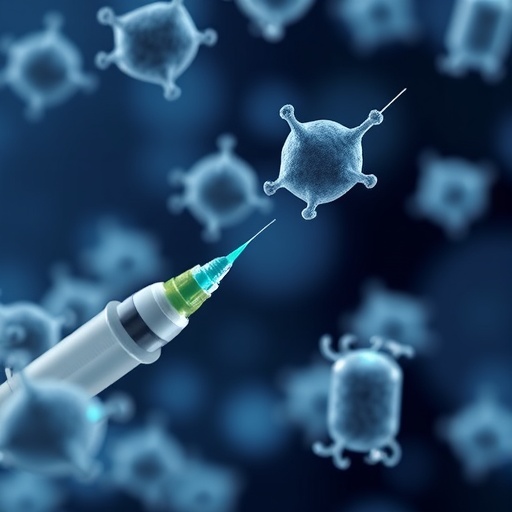In a groundbreaking advancement for global health, researchers at the University of Maryland School of Medicine’s Center for Vaccine Development and Global Health (CVD) have announced the successful completion of a Phase 1 clinical trial for an innovative vaccine targeting two of the most devastating bacterial infections affecting children in sub-Saharan Africa: typhoid fever and invasive non-typhoidal Salmonella (iNTS). This novel vaccine, known as the Trivalent Salmonella Conjugate Vaccine (TSCV), promises not only to fill a critical gap in infectious disease prevention but also to revolutionize pediatric health in regions where these infections cause a significant burden of illness and mortality.
Typhoid fever and iNTS represent major public health challenges, particularly in low-resource settings. Caused by distinct yet related species of Salmonella bacteria, these infections lead to severe disease manifestations, including high fever, sepsis, and in many cases, death. The TSCV vaccine uniquely leverages conjugate technology, wherein polysaccharide molecules derived from the outer coats of Salmonella typhi and two predominant non-typhoidal Salmonella serotypes are chemically linked to carrier proteins. This conjugation enhances the immune system’s ability to recognize and mount a robust response to these pathogens.
The Phase 1 clinical investigation was meticulously designed as a randomized, placebo-controlled trial enrolling 22 healthy adult volunteers in the United States. Participants received either a low dose (6.25 micrograms), a high dose (12.5 micrograms) of the TSCV, or a placebo injection. Safety and immunogenicity were the primary endpoints. Encouragingly, the vaccine demonstrated an excellent safety profile; adverse events were minor and transient, limited primarily to mild localized pain at the injection site. Crucially, every vaccine recipient exhibited strong immune responses against all three vaccine components, evidence of potent immunogenicity that was absent in placebo recipients.
The robust antibody responses induced by TSCV underscore the vaccine’s potential to confer protection across a spectrum of Salmonella infections. In addition to humoral immunity, the vaccine elicited activation of specific cell-mediated immune pathways, notably stimulating white blood cells involved in pathogen clearance. This multifaceted immune activation is particularly promising, suggesting the vaccine can provide both mucosal and systemic protection—a critical factor in combating invasive Salmonella infections that transcend the gut to cause widespread disease.
Notably, some trial participants demonstrated pre-existing antibody titers against Salmonella antigens, likely reflecting prior exposure through foodborne illness. This phenomenon of immunological priming could have amplified the durability and strength of vaccine-induced immunity in these adults. While adult immune systems may respond differently than those of infants, the research team remains optimistic about achieving protective immunity in the most vulnerable pediatric populations that bear the heaviest global burden of these infections.
The study’s principal investigator, Dr. Wilbur Chen, emphasizes the global health implications of this research. He notes that TSCV could become an indispensable tool in regions like sub-Saharan Africa, where more than 420,000 cases of invasive Salmonella disease and 66,000 related deaths were recorded in 2017 alone, predominantly affecting young children. Typhoid fever accounts for an additional 650,000 cases and nearly 9,000 deaths annually in these areas, accentuating the urgent need for broad-coverage vaccines.
The development of TSCV builds upon the established Typbar TCV™ vaccine platform, prequalified by the World Health Organization and licensed by Bharat Biotech International Limited (BBIL), a partner in this endeavour. This collaboration has enabled the integration of conjugate vaccine technology with polysaccharide antigens from multiple Salmonella serotypes, aiming to deliver a combined protective effect against both typhoidal and non-typhoidal Salmonella diseases.
Beyond its impact in endemic regions, the vaccine holds promise for addressing a significant public health issue in the United States. Salmonella infections, predominantly acquired via consumption of contaminated poultry, eggs, and produce, cause an estimated 1.35 million illnesses and over 26,000 hospitalizations annually. Since the vaccine targets serotypes common in US infections, its utility could extend to domestic populations as well, potentially reducing the burden of foodborne Salmonella disease.
Immunologically, conjugate vaccines like TSCV represent a substantial advancement over traditional polysaccharide vaccines. By chemically linking the polysaccharide antigens to carrier proteins, TSCV induces T-cell dependent immune responses. This mechanism not only enhances antibody production but also generates immunological memory, a key feature for long-lasting protection, especially in young children whose immune systems typically respond poorly to polysaccharide antigens alone.
Future directions, as outlined by co-author Dr. Myron Levine, include expanding functional assays to better understand correlates of protection, as well as conducting clinical trials in pediatric populations where efficacy must be firmly established. Researchers are particularly interested in evaluating vaccine performance in infants and young children in endemic settings, given that they represent the group most vulnerable to severe outcomes from these infections.
The clinical trial outcomes mark a pivotal first step in the pathway towards a broadly protective vaccine against Salmonella infections. While the sample size was limited to a small cohort of healthy adults, the clear demonstration of safety and immunogenicity provides a compelling rationale for advancing to larger-scale efficacy trials. The ultimate goal is to deploy this vaccine in high-burden regions, potentially transforming the epidemiology of these deadly diseases and significantly reducing childhood morbidity and mortality.
In sum, the development of the Trivalent Salmonella Conjugate Vaccine is a beacon of hope in the fight against bacterial infections that have resisted comprehensive vaccine solutions for decades. It stands as a testament to the power of contemporary vaccine technology and international collaboration in addressing some of the most entrenched challenges in infectious disease prevention globally.
Subject of Research: People
Article Title: A combination typhoid and non-typhoidal Salmonella polysaccharide conjugate vaccine in healthy adults: a randomized, placebo-controlled phase 1 trial
News Publication Date: 8-Oct-2025
Web References: https://www.nature.com/articles/s41591-025-04003-z
References: 10.1038/s41591-025-04003-z
Keywords: Vaccine research, Salmonella, Typhoid, Infectious diseases, Bacterial infections
Tags: conjugate vaccine technologyGlobal Health Initiativesinfectious disease prevention strategiesinvasive non-typhoidal Salmonella vaccinenew vaccine trials for childrenpediatric health advancementsPhase 1 clinical trial resultspublic health challenges in AfricaSalmonella bacterial infectionssub-Saharan Africa health issuestyphoid fever vaccine developmentvaccine efficacy against Salmonella





